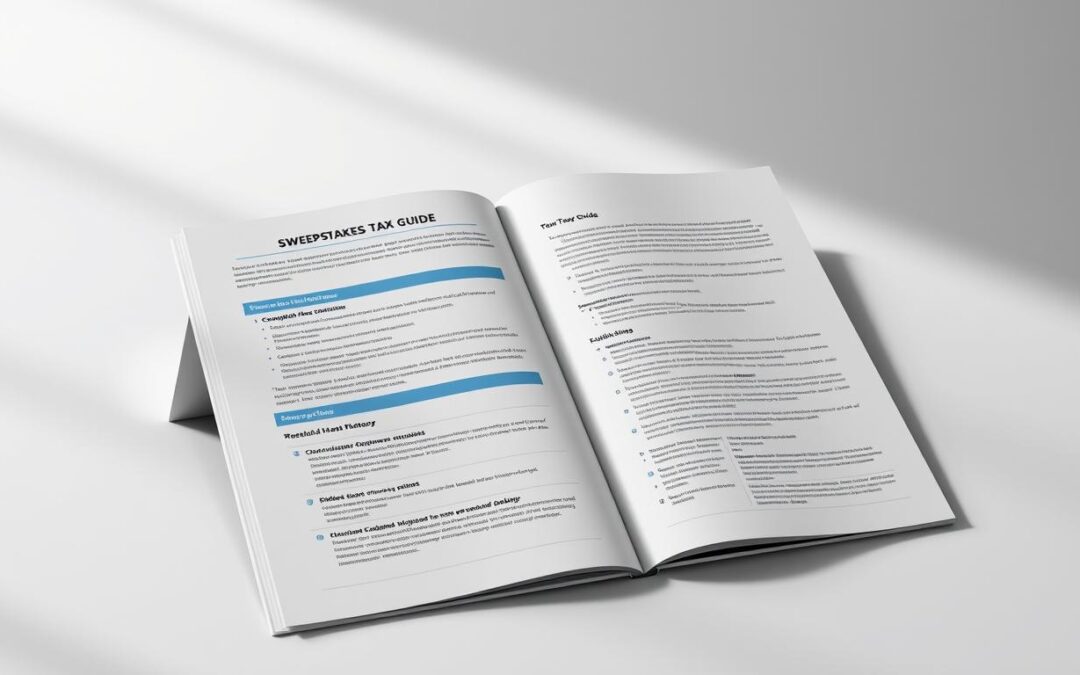Winning a sweepstakes prize is thrilling. But, understanding the tax rules for gifting it is key. Knowing how to handle taxes on a sweepstakes prize helps avoid IRS problems.
The tax rules for sweepstakes prizes can be tricky. The IRS sees these prizes as income. So, both the giver and the receiver might face tax duties.
This guide will help you manage taxes on a sweepstakes prize gift. You'll learn how to figure out the prize's value and what tax reports you need to file. You'll get tips on making smart choices with your winnings.
Key Takeaways
- Sweepstakes prizes are considered taxable income by the IRS
- Gift tax rules apply to high-value prizes
- Proper documentation is critical for tax reporting
- Different states may have unique tax regulations
- Consulting a tax professional can help navigate complex situations
Understanding Sweepstakes Prizes and Taxes
Winning a sweepstakes is exciting, but knowing about taxes is key. The IRS sees sweepstakes winnings as income you must report. This means you'll need to include these prizes on your tax return.
Sweepstakes prizes can be cash, merchandise, or experiences. The tax on these prizes can change how much you get to keep. The value of your prize determines your tax obligations and reporting needs.
What Counts as a Sweepstakes Prize?
A sweepstakes prize is any reward won without buying something. These can include:
- Cash awards
- Vacation packages
- Vehicles
- Electronics
- Gift cards
IRS Perspective on Prize Winnings
The IRS sees sweepstakes prizes as income, no matter the type. If your prize is worth over $600, you'll get a Form 1099-MISC from the sponsor. This means you must report these winnings on your taxes.
Pro Tip: Keep detailed records of all sweepstakes prizes, including their fair market value and any associated documentation.
Knowing about sweepstakes taxes helps you make smart choices about prizes. Proper tax planning can help you save money and follow IRS rules.
Gift Tax Basics
Understanding gift tax rules is key when giving away sweepstakes prizes. The Internal Revenue Service (IRS) has rules that affect how you give away valuable prizes.
There are important things to think about when giving away sweepstakes prizes. IRS rules on gift taxes for sweepstakes prizes can be complex. But knowing the basics helps you make smart choices.
What Is Gift Tax?
Gift tax is a federal tax on giving property or money without getting something back. For sweepstakes winners, this is especially important with big prizes.
- The annual gift tax exclusion lets you give up to $17,000 per person without tax
- Gifts over this amount might need a gift tax return
- The lifetime gift tax exemption is $12.92 million (as of 2023)
How Does Gift Tax Apply to Sweepstakes Prizes?
Not every sweepstakes prize will have gift tax issues. The prize's value and your relationship with the recipient matter a lot. If you're giving a big prize, think about the tax implications.
Get advice from a tax expert to understand the tax effects of gifting a sweepstakes prize.
With careful planning, you can reduce tax worries when giving away sweepstakes prizes. Knowing IRS rules helps you share your luck while following the law.
Determining the Value of the Prize
Understanding the tax rules for sweepstakes prizes is key. The IRS has clear guidelines for figuring out what a prize is worth. This is called the fair market value.
Winners need to look at many things to find the total value of their prize. It's not just the first price they see.
Assessing the Fair Market Value
The fair market value is what a prize would sell for in a real market. To find this, you need to consider a few important things:
- The original retail price of the item
- Current market conditions
- Condition of the prize
- Potential depreciation
Including Additional Costs in the Prize Value
The total value of a prize isn't just the prize itself. Other costs can also affect the taxes you pay.
- Shipping and handling fees
- Installation costs
- Taxes paid at the time of prize receipt
- Any required maintenance or setup expenses
Pro tip: Always keep detailed documentation of the prize's full value to ensure accurate tax reporting.
Knowing how to value prizes helps winners understand their tax situation better. This way, they can make smart choices about their prizes and taxes.
Tax Responsibilities for the Winner
Winning a sweepstakes is exciting, but knowing about taxes is key. The IRS says winners must report their winnings. This can change how much you pay in taxes each year.
When you win, the organizer might give you a Form W-2G. This form helps track your winnings and makes sure you report them to the IRS.
Reporting Prize Income
Getting a prize means you need to document it well. You must report your winnings on your federal tax return, usually on Form 1040. Here's what you need to do:
- Collect all prize documentation
- Determine the fair market value of the prize
- Report the full value of the prize as income
- Calculate potential tax liability
Federal and State Tax Considerations
Taxes depend on the prize's value and your tax bracket. The IRS sees sweepstakes winnings as taxable income. This means you might have to pay federal and state taxes on the prize's full value.
"Know your tax responsibilities before celebrating your win!" - Tax Experts
Also, your state might have its own tax rules for sweepstakes winnings. It's important to know these local laws.
When to Gift a Prize
Deciding when to gift a sweepstakes prize involves careful planning. The right timing can help lower your gift tax and reduce your overall taxes.
Timing is key when gifting a sweepstakes prize. The IRS offers guidelines to help manage your taxes better.
Strategic Gift Timing Considerations
Good timing can greatly affect your taxes. Here are some strategies to consider:
- Spread the gift value across multiple tax years
- Use the annual gift tax exclusion limit
- Plan gifts based on your financial situation
Understanding Tax Year Implications
The tax year of your gift matters for both you and the recipient. Planning carefully can improve your tax situation.
Tax rules change often, so always talk to a tax expert before big gift decisions.
Consider the current gift tax exclusion and your financial goals. Each year offers chances to manage sweepstakes prize gifts well.
- Check the current year's gift tax exclusion limit
- Look at your total gift value
- Think about tax effects for both sides
By timing your sweepstakes prize gift wisely, you can lower your taxes. This way, you can use tax exemptions to your advantage.
Gifting vs. Accepting the Prize
Winning a sweepstakes can be both exciting and confusing. You must think about the tax rules when deciding to keep or give away the prize. This choice depends on your financial situation and the tax rules for gifting prizes.

- Current income tax bracket
- Potential future tax liabilities
- Personal financial goals
- Prize value and type
Assessing Your Financial Landscape
The tax rules for sweepstakes prizes can affect your money plans. Some might choose to give their prize away. Others might keep it to help their finances.
"Understanding your unique tax situation is crucial when deciding the fate of a sweepstakes prize." - Tax Expert
Strategic Considerations for Prize Management
Think about these key points before you decide:
- Income Threshold: See if the prize raises your tax bracket
- Gift Tax Limits: Check the current gift tax exclusion amounts
- Long-Term Financial Impact: Think about how the prize affects your long-term money plans
Talking to a tax expert can give you advice that fits your situation. They can help you understand the tax rules and make a smart choice.
Filing Taxes for Gifts
Understanding IRS rules on gift taxes for sweepstakes prizes can be tricky. It's important to report and document gifts properly. Knowing the tax rules helps you follow federal tax laws.
Reporting Your Gift on Tax Returns
When you gift a sweepstakes prize, you must fill out certain IRS forms. The main form for reporting gifts is Form 709 (United States Gift Tax Return). This form tracks the value of gifts and checks for tax owed.
- Complete Form 709 for gifts over the annual exclusion amount
- Report the fair market value of the sweepstakes prize
- Include detailed information about the gift recipient
Essential Documentation for Gift Reporting
Keeping accurate records is key when gifting sweepstakes prizes. You'll need the following documents for your tax return:
- Prize valuation documents
- Receipt of prize transfer
- Appraisal for high-value non-cash prizes
- Recipient's contact information
Pro Tip: Consult a tax professional to ensure accurate reporting and minimize potential tax complications.
Remember, each sweepstakes prize has its own tax rules. Review the prize details and think about the tax implications before gifting.
Seeking Professional Advice
Understanding sweepstakes prize tax implications can be tough. When you win big, getting help from a tax expert is key. They can guide you through the tax on sweepstakes winnings.
- Winning high-value prizes exceeding $5,000
- Complicated personal tax situations
- Potential gift tax considerations
- Prizes with complex valuation
When to Consult a Tax Expert
Not every sweepstakes win needs a tax pro. Smaller prizes usually don't cause big tax issues. But, big wins or tricky gifting situations need expert advice.
Finding the Right Tax Professional
Finding the right tax advisor is important. Look for someone with:
- Knowledge in prize and lottery tax laws
- Gift tax expertise
- Understanding of state tax laws
- Skills in tax planning
Check their credentials with groups like the National Association of Tax Professionals or the American Institute of CPAs. A good expert can lower your taxes and make sure you follow IRS rules.
State-Specific Regulations
Understanding the tax rules for sweepstakes prizes can be tricky. Each state has its own tax laws. These laws can greatly affect how prizes are taxed.

To grasp the sweepstakes prize tax deduction, you need to know local tax rules. States have different views on taxing prizes. This can make things tough for winners.
Key State Tax Variations to Consider
- Some states impose additional taxes on prize winnings
- Certain states have more lenient gift tax regulations
- Tax rates can vary dramatically between jurisdictions
Resources for Local Tax Research
To get a handle on your state's tax rules, check out these resources:
- State Department of Revenue websites
- Certified tax professional consultations
- IRS state-specific tax guides
- Local tax preparation services
Pro tip: Always verify current tax regulations, as state laws can change frequently.
Accurate local tax research is crucial for managing the financial impact of sweepstakes prizes.
The tax rules for sweepstakes prizes can lead to unexpected money issues. By researching state-specific laws, winners can better handle their prizes and tax problems.
Common Misconceptions About Taxing Prizes
Understanding gifting sweepstakes prize tax can be tricky. Many winners believe false myths about sweepstakes winnings tax. These myths can cause big financial problems.
Let's clear up some common misconceptions:
- Myth: All prizes are tax-freeReality: The IRS asks you to report most sweepstakes winnings over $600. Prizes are seen as taxable income, no matter what they are.
- Myth: Gifting a prize automatically eliminates tax liabilityReality: Giving away a sweepstakes prize doesn't automatically clear tax issues. The original winner might still have to report the prize's value.
- Myth: Small prizes don't need to be reportedReality: Even small prizes must be fully disclosed to the IRS.
"Knowledge is power when it comes to managing sweepstakes prize taxes" - Tax Expert
Knowing these myths can help you make smart choices about your sweepstakes winnings. It can also help with gift tax issues.
Conclusion: Be Informed Before Gifting
Understanding taxes on sweepstakes prizes is key. It's not just about winning—it's about making wise financial choices. These choices help keep your money safe.
Final Tips for Handling Sweepstakes Prize Taxes
Taxes on sweepstakes prizes can be tricky. But knowing the rules helps a lot. Always note the prize's value, keep records of gifts, and talk to a tax expert.
Staying Ahead on Tax Responsibilities
Being smart about taxes is important. Whether you keep or give away the prize, knowing IRS rules is crucial. Being open with tax officials and planning early can avoid money problems later.
With smart planning and expert advice, you can turn a surprise win into a good financial move. This way, you stay within tax laws and make the most of your prize.
